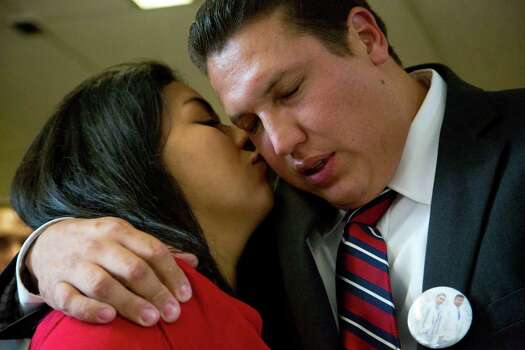
After being acquitted for murder (right) David Barajas hugs and gets a kiss from his wife (left) Cindy Barajas while addressing the media at the Brazoria County courthouse Wednesday August 27, 2014. David Barajas, 32, was accused of shooting Jose Banda, 20, after he struck his two sons, aged 11 and 12, on a rural Texas road in 2012.
Local news reports
The bereaved father who witnessed the death of his two young children did not murder the drunken driver who killed them, a jury here in Brazoria County decided Wednesday, a coda that ratcheted up the emotions already thought to have peaked when both sides lost loved ones.
The jury acquitted David Barajas, who faced a murder charge in the shooting death of a 20-year-old man, Jose Banda. Banda drove his Chevrolet Malibu into the children while they pushed their father's stalled Ford 250 truck on an unlit road near Alvin to their nearby house. In a fit of retaliatory rage, prosecutors argued, Barajas returned to his home, retrieved a pistol and fired away at Banda's head with revenge.
But prosecutors faced an uphill climb in erasing any reasonable doubt in jurors' minds. Police failed to produce a murder weapon linked to the killing, gunpowder residue tests on Barajas' hands were negative and no witnesses saw anything that transpired on the dark December night. Though Barajas' attorneys could not identify who else could have killed Banda, who had a blood alcohol level twice the legal limit, the lawyers managed to create enough ambiguity that pushed a conviction out of reach.
Now that's getting away with murder.
ReplyDeleteYesiree, Texas style.
DeleteConstant bitching about how minorities are disproportionately convicted of gun crimes and other crimes; but then, when a minority guy is acquitted on a completely circumstantial case with NO physical evidence like GSR or a weapon to back it up, you get upset? It's suddenly bad for a jury to question the police's assumptions and reject a circumstantial case?
Delete"The defense called only three witnesses to testify during the trial, which began last week. But prosecution witnesses told jurors during questioning by Cammack that more gunfire had taken place well after Banda was shot - pointing to the possibility that the actual shooter was still at large - and that a search of Barajas' home failed to find any evidence that directly or indirectly linked him to the crime scene.
ReplyDeleteCammack also suggested that Banda could have been shot by his own cousin or half-brother, who told investigators that they witnessed the crash but fled the scene. Both testified that they did not shoot Banda.
Cammack also used 911 calls to create a timeline that suggested Barajas would not have had enough time to shoot Banda."
http://www.cbsnews.com/news/jury-finds-texas-dad-not-guilty-of-murdering-sons-killer/
"Brazoria County District Attroney Jeri Yenne said she believed prosecutors had a fair chance to convince a fair jury. The system worked, she said, regardless of whether the government met their burden of proof.
"The state would never present a case against an individual who we did not believe committed a crime. So good people can agree to disagree," said Yenne. "We knew going in that a circumstantial evidence case was tough. We know the emotion attached to it. We're all human."
As the prosecutor said, the system worked. Not only did the defendant tast negative for firing a weapon, there were other people who fled the scene. This equals a proper verdict by the jury. And since you've been mentioning ethnicity lately, observe that it worked for someone who isn't white.
It's not the burden of the defendants attorneys to identify a killer. No murder weapon, no powder residue, no conviction. Sure it sounds iffy and what unknown could have been there and why would they have killed him? More than motivation is needed for conviction. No double jeopardy, I wonder if the police will continue to investigate the killing, or do they think the killer just got off?
ReplyDelete